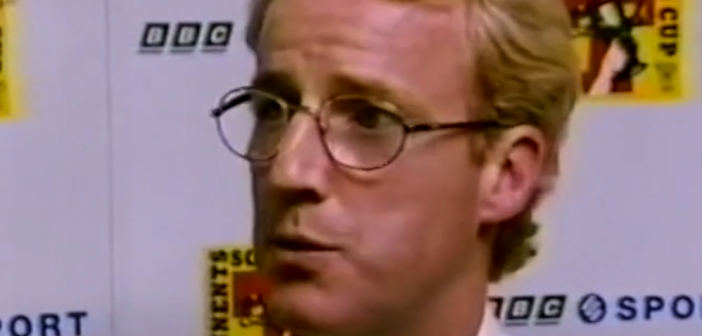TOMMY BURNS’ last goodbye as Celtic manager came in the aftermath of a shock 1-0 Scottish Cup semi-final replay defeat against this evening’s oppponents Falkirk on April 23 1997.
The loss to the First Division mid-table side brought the end to the Hoops’ legend’s three years in charge of the team. It was an agonising farewell for a massively popular figure in the club’s history.
Author Alex Gordon, writing in his book, ‘The Winds of Change’, recalled the dreadful finale.
Here is an edited extract from the chapter.
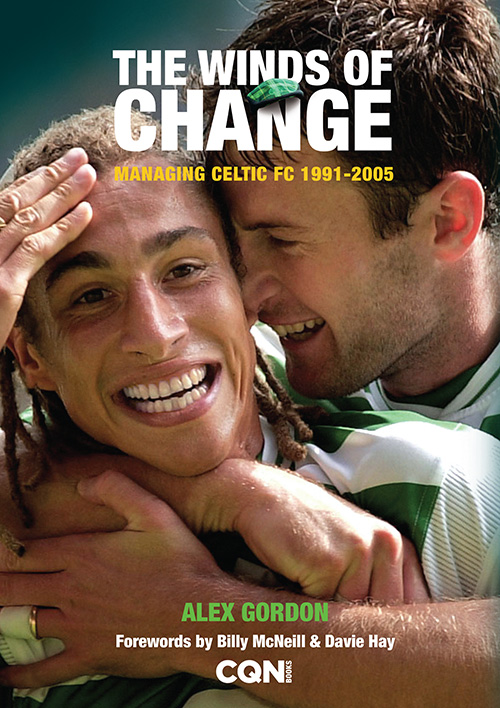
IT WAS becoming increasingly obvious a solitary dark cloud would always find Tommy Burns on a sunny day.
However, the manager warmed to the prospects of the Scottish Cup semi-final which was due at Rangers’ stadium while Hampden was under reconstruction. With a hint of candour, Burns said, ‘I think people are wondering about the possibility of a shock at Ibrox and will be sitting back and hoping to get it.
‘Since we lost to Rangers in the league, there has been nothing much for anyone at the club to smile about and this Saturday the onus is on us to make the supporters smile again.
‘We must beat Falkirk, keep our season alive and put ourselves in a position to lift silverware. The importance of a Cup win should not be underestimated. Claiming the Scottish Cup would mean that the season was successful.
‘We still have a ghost of a chance of winning the title with four games left to play and, as long as that is the case, we will concede nothing.’
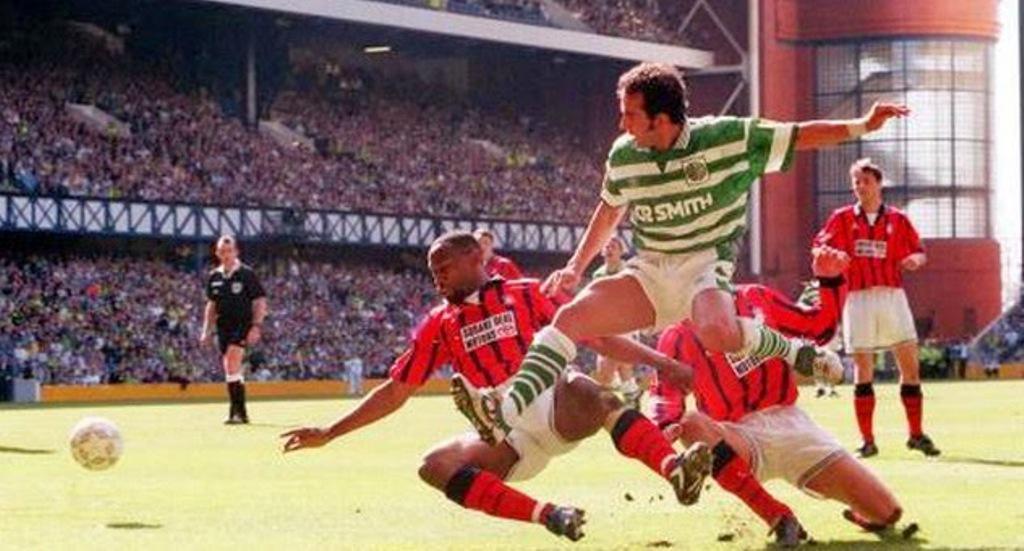
ACTION MAN…Paolo di Canio puts pressure on the Falkirk defence in the 1-1 semi-final draw at Ibrox.
Burns was eight minutes away from leading Celtic to their second Scottish Cup Final appearance in three years when fate stepped in. Tommy Johnson scored his first goal for the club after a strangely-subdued sixty-six minutes on a perfect afternoon for football.
Craig Nelson, the Falkirk keeper, could count himself unlucky when, after blocking efforts from Di Canio and Cadete, the ball eventually broke to Johnson who casually swept it home. Later on, the Englishman had the opportunity to make certain when he bore down on Nelson, but his effort was repelled and, with bewildering speed, the Brockville side had switched play to the other half of the pitch and equalised.
Falkirk manager Alex Totten urged his 6ft 7in centre-half Kevin James to move up front and the gamble paid off handsomely. After Nelson’s save, the ball was delivered down the right wing to Jamie McGowan who arced a cross into the box from close to the bye-line.
Stewart Kerr, eyes firmly on the ball, was about to spring and cut out the danger when he lost his footing. Falling backwards, the keeper tried frantically to paw the ball away, but James leapt with conviction to bury a header into the empty net. A replay on April 23 would be required at the same venue.
Burns kept it brief afterwards. ‘We’ll be back on Wednesday week and we’ll get the job done then.’ The words were delivered through clenched teeth.
Tommy Burns’ grimmest nightmare was just around the corner.
Swollen, dark clouds hovered menacingly over the south side of Glasgow for most of the day and threatened a downpour on the evening of Wednesday, April 23. As the Celtic team coach turned into the Ibrox car park, the arrival of the manager, staff and players was greeted by a deluge from the heavens.
The torrential rain still hammered down long after the full-time whistle and the last of the drenched 35,879 fans had escaped to the refuge of shelter elsewhere. Somehow, the drab, grey, unappealing setting seemed so fitting for what had just unfolded on a soaking, greasy Ibrox playing surface with a restless wind also creating chaos.

Celtic were removed from the Scottish Cup. And the manager was days away from being out of a job.
The team that had destroyed Rangers in the quarter-finals never got out of the starting blocks. Certainly, they could insist the monsoon conditions played a part in their downfall, but Falkirk, with more aggression and gumption, harnessed their energy and focused their attention of a place in the Cup Final the following month.
They scored in the nineteenth minute and Celtic did little in the remaining seventy-one minutes to conjure up a suitable reply.
Paul McGrillen took advantage of a moment of hesitancy from Stewart Kerr to get the goal. Falkirk, quite rightly in the dire conditions, had adopted a shoot-on-sight policy and the keeper had already fumbled a long-range shot and misjudged a wind-assisted cross.
On this occasion, McGowan, provider of the equaliser in the first game, sent a long, diagonal ball into the penalty area. David Hagen swung a foot at the half-chance, but, in his haste, merely scooped the ball up for the unmarked McGrillen six yards out and he looped a header over the motionless and stranded Kerr.
It was a bleak evening when too many Celtic players became anonymous and disappeared in the drizzle. Celtic left the field to a prolonged storm of boos while green-and-white scarves were hurled onto the track. This was not the way it was supposed to be.
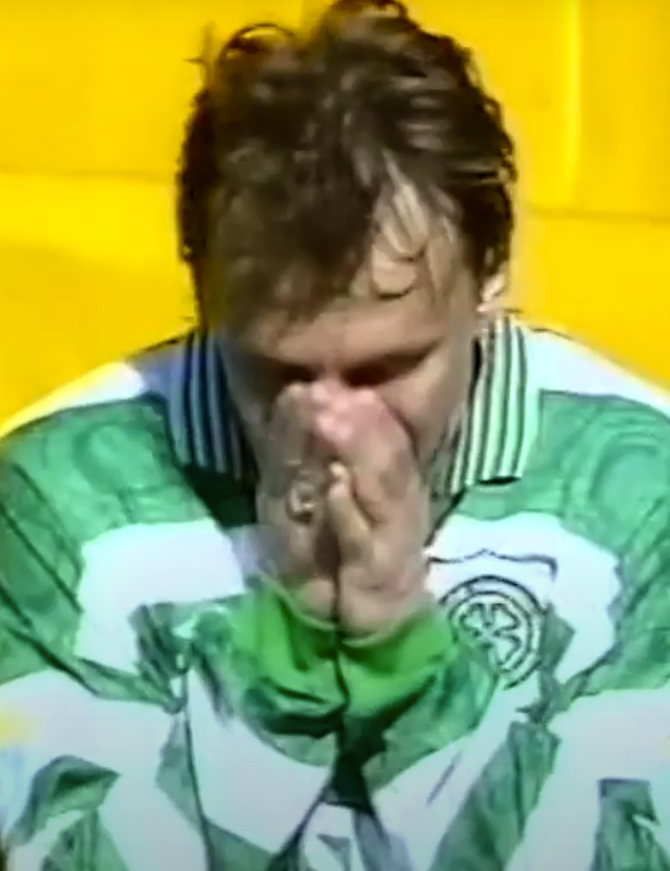
WHAT A MISS…Andreas Thom holds his head after failing for six yards in the first game.
No criticism could be levelled at Paolo di Canio, captain of the team on a night of rampant derision and vehement discourse. He became so irate with the performance of Willie Young that he suggested the referee might want to be manager of Rangers the next time he returned to Ibrox. The match official wasn’t amused, reported the Italian to the SFA and they slapped a two-game ban on him.
The rapport the Celtic boss once had with the media had been withering in recent weeks. He believed a lot of the criticism was over the top and, naturally, he took some of it personally. He would not have enjoyed reading this excerpt from a daily newspaper the morning after the Ibrox defeat.
It stated, ‘Tommy Burns’ time as Celtic manager looks to be at an end after his team lost this Scottish Cup semi-final replay to Falkirk and completed a second consecutive season without a trophy.
“It was the second time in three years that Celtic had lost a Cup-tie to First Division opposition at Ibrox and now the numbers no longer stack up in Burns’ favour. Three years in, the job has seen the manager spend £15million on new players and win only one trophy, the Scottish Cup, against Airdrie, another First Division side, in 1995.
“Six months earlier, Celtic had lost the League Cup Final to Raith Rovers. Rangers, meanwhile, have this season equalled Celtic’s cherished record of nine league championships in a row and have done so while winning all four Old Firm derbies for the first time in the twenty-two history of the Premier Division.”
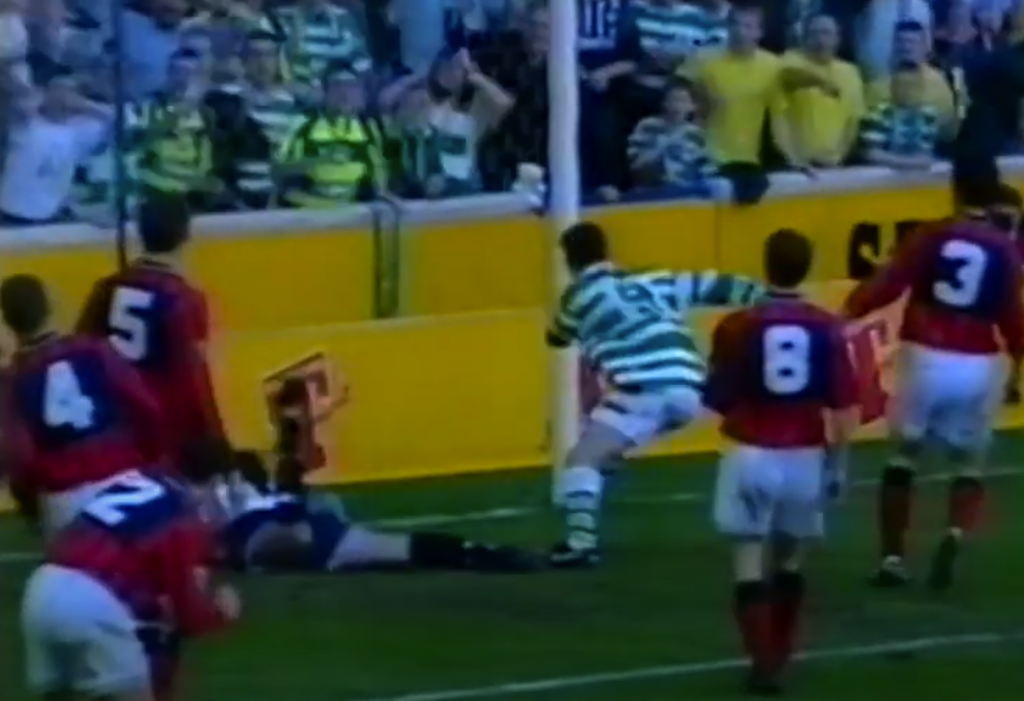
JOHNSON’S JOY…new Bhoy Tommy Johnson turns away in delight after putting Celtic ahead in the 1-1 stalemate.
The report continued, “The question of Burns’ future always presents a dilemma of the heart versus the head for the Celtic support. A much-loved player with the club, Burns’ departure would be the cause of sorrow among sentimentalists.
“The heads of the Celtic supporters, though, tell them that results like the one against Falkirk only confirm the manager’s position as being untenable. Once again, the team’s level of motivation was called seriously into question.
“Being taken to a replay by a side who are mid-table in the First Division was bad enough. Losing to Falkirk was unforgiveable.”
Burns said, ‘There is nothing to describe my disappointment – nothing. My greatest fear as a player was being involved in something like this. I was fortunate that, in fifteen years as a Celtic player, nothing like this ever happened to me. That is what makes this result all the harder to take. It is very difficult.’
He was asked if the result might sway Fergus McCann’s decision in the delicate matter of renewing his contract. Candidly, he admitted, ‘That’s possibly right. We live or die by success in this job and players are the same.
‘People know my feelings for Celtic, they will know how deeply hurt and embarrassed I am. I have never been frightened to accept my responsibilities. It was my team who lost the game. My responsibility. No excuses.
‘I spent fifteen years as a player at Celtic Park. I can handle pressure. But I have to admit that we have too many players who can’t take the strain. It’s at a time like this that you find out about players. I was never afraid of a challenge, but that challenge has to be accepted by players as well as management.
‘We have been hanging on to Paolo Di Canio’s coat-tails and need someone to help him shoulder responsibility. There was a desperate lack of leadership against Falkirk. It was disappointing and embarrassing.’
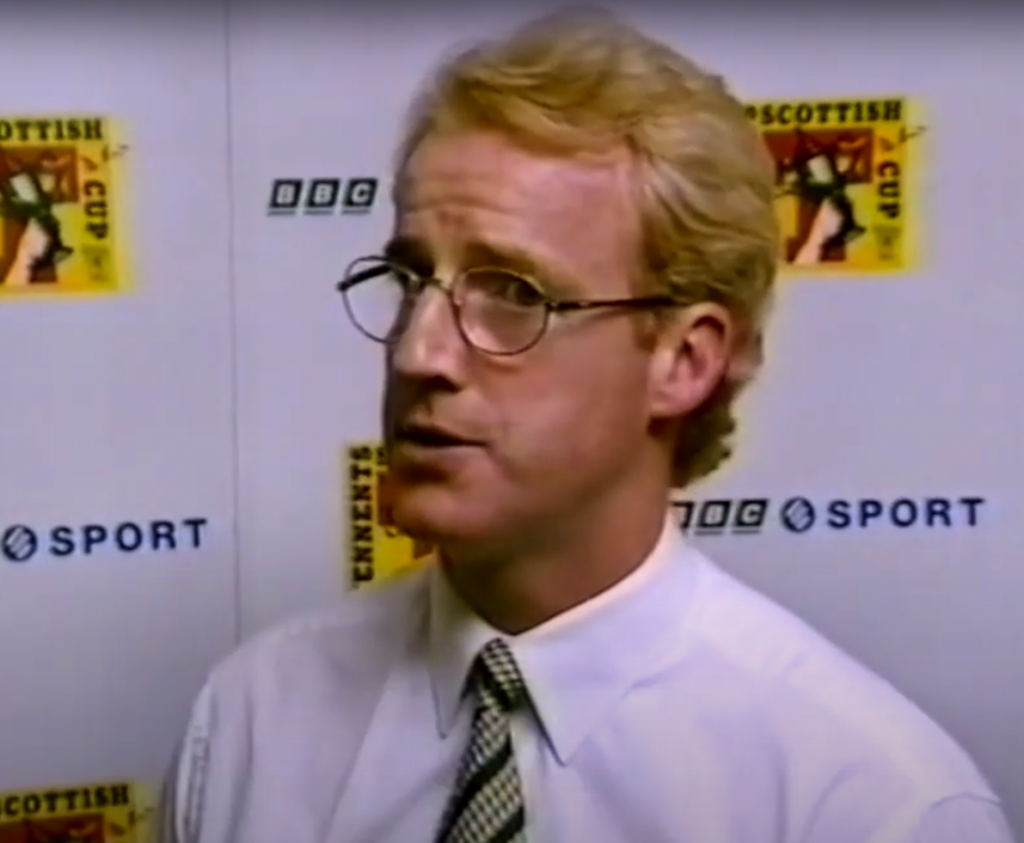
SCREEN TEST…Tommy Burns interviewed after the Scottish Cup disappointment.
Di Canio, too, refused to hide when he was asked for his thoughts. He said, ‘Before the game, I didn’t think it would be possible for this to happen. The manager spoke to us, but we played differently to what he wanted. S
‘So it was the players’ fault, not the manager and not the fans. We put thirty-five balls into the box, but no-one was there. The fans need more passion from us.’
The excitable Italian added, ‘Now there is confusion in my head because the one trophy we had left is now finished. There is also a debt in my head to the fans and the manager. I think Tommy Burns merits from Fergus McCann to stay here for a long time. Tommy is good for me, he is a good manager and a good person.
‘I came here from Italy where I played with five or six teams with different managers. They were all different tactically and as people, but Burns is a good man, as well. When he said the team lacked leadership, he spoke the truth and we have to roll up our sleeves for him.’
Stirring and gallant sentiments from Di Canio, but all too late to rescue Tommy Burns. The blood was already in the water and the sharks were beginning to circle.
Davie Hay recalled, ‘I was at Old Trafford that night watching a Champions league tie between Manchester United and Borussia Dortmund. I wasn’t looking at any specific player, but it was always handy to have a clue about someone’s ability if they suddenly became available and they were within our price range.
‘At the end of the game, which United lost 1-0, a Glasgow businessman I knew well and who was big friend of Alex Ferguson, shouted over to me. “Davie, have you heard the score at Ibrox?” I told him I hadn’t and my heart sank when he replied, “You’re never going to believe it, Falkirk won 1-0.”
‘I didn’t see that one coming, that’s for sure. And, of course, I immediately thought about Tommy. I realised he would be devastated. And then, of course, you wonder about what comes next.’

Fergus McCann made the decision to ultimately sack Tommy Burns on May 2. The friction between two strong-willed characters, with Celtic as their dominant interest, but with vastly different views of how to progress, had been there from the first weeks of working together. Burns would later admit, ‘My relationship with Fergus deteriorated to the point there was no returning, basically after weeks in the job.
‘So, it was a difficult three years in trying to build a relationship because we didn’t really have one. I just basically didn’t like him, but I’m open-minded enough to think being in his position he probably didn’t like this wee guy who’s come from the Gallowgate and played for Celtic.’
On the fateful day of Burns’ last day as Celtic manager, McCann asked the head of security to escort the newly-unemployed boss to the back door.
Tommy stood proud and said, ‘I came in through the front door and, sure as God, I’ve not done anything to make me want to walk out the back door.’

